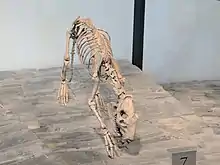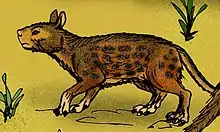Miniochoerus
Miniochoerus is an extinct genus of small oreodont endemic to North America. They lived during the Late Eocene to Early Oligocene 38–30.8 mya, existing for approximately 7 million years .[1] Fossils have been found only in North Dakota, South Dakota, Nebraska, Montana, and Wyoming.
| Miniochoerus | |
|---|---|
 | |
| M. gracilis skeleton, Natural History Museum of Los Angeles | |
| Scientific classification | |
| Kingdom: | Animalia |
| Phylum: | Chordata |
| Class: | Mammalia |
| Order: | Artiodactyla |
| Family: | †Merycoidodontidae |
| Subfamily: | †Miniochoerinae |
| Genus: | †Miniochoerus Schultz and Falkenbach, 1956 |
| Type species | |
| Miniochoerus battlecreekensis | |
| Species[1] | |
|
See text | |
| Synonyms | |
Species
- M. affinis (syn. Merycoidodon platycephalus, M. battlecreekensis, Oreodon coloradoensis, Stenopsochoerus sternbergi)
- M. chadronensis (syn. Parastenopsochoerus conversensis, Stenopsochoerus douglasensis, S. reideri)
- M. forsythae
- M. gracilis
- M. starkensis (syn. M. cheyennensis, M. helprini, M. nicholsae, M. ottensi, Platyochoerus hatcreekensis, P. heartensis, Stenopsochoerus berardae, S. joderensis)
Description

Restoration
Typically, there were about the size of a small dog. Their skulls were small and short, compared to other oreodont species, many of which had proportionately large heads. Unlike other oreodont species, they had small canines which would have done little good against foes. The genus arose during the late Eocene, and survived the Late Eocene extinction event, giving rise to a dwarfed lineage during the early Oligocene.[3]
References
- Stevens, M.S.; Stevens, J.B. (1996). "Merycoidodontinae and Miniochoerinae". In Prothero, D.R.; Emry, R.J. (eds.). The terrestrial Eocene-Oligocene transition in North America. Cambridge: Cambridge University Press. pp. 498–573. ISBN 0-521-43387-8.
- Subgenus not recognized by Stevens and Stevens.
- Prothero, D.R. (2006). After the Dinosaurs: The Age of Mammals. Indiana University Press. ISBN 0-253-34733-5.
This article is issued from Wikipedia. The text is licensed under Creative Commons - Attribution - Sharealike. Additional terms may apply for the media files.